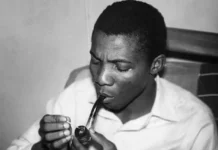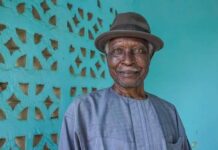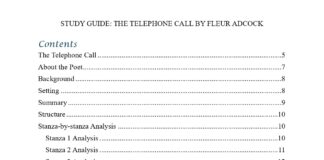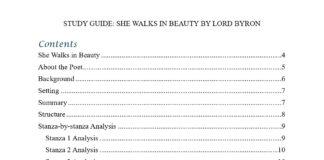Quality UTME Lessons for Art Students
Individual and group classes • Student-friendly rates
📞 Contact Ayomiposi on WhatsApp now
🎥 We’re cooking something delicious for you on our YouTube channel. In the coming days, you will learn SSCE literature texts like you're in class 📚✍🏽
Be part of this new journey we are about to embark on.
🔔 Subscribe Now
Ngũgĩ wa Thiong’o (1938–2025) was a celebrated Kenyan novelist, playwright, essayist, and academic, widely regarded as one of the most influential voices in postcolonial African literature.
Known for groundbreaking works like Weep Not, Child, The River Between, and Decolonising the Mind, Ngũgĩ used literature as a tool of liberation. His transition from writing in English to his native Gikuyu redefined African literary identity.
This biography explores the life, major works, ideology, and impact of Ngũgĩ wa Thiong’o on African literature and beyond.
Early Life and Education
Born James Ngugi on January 5, 1938, in Kamiriithu, Kenya, Ngũgĩ wa Thiong’o grew up during British colonial rule and the Mau Mau uprising.
The violence of the colonial period deeply affected his family: his brother died in the rebellion, and his mother was tortured. These traumatic events became the backdrop for many of his later works.
Ngũgĩ attended Alliance High School and later Makerere University in Uganda, where he discovered his literary voice.
His first play, The Black Hermit, debuted in 1962, and his novels Weep Not, Child (1964) and The River Between (1965) were published shortly after, with support from Chinua Achebe and the African Writers Series.
Major Literary Works and Style
Ngũgĩ’s early novels (Weep Not, Child, The River Between, and A Grain of Wheat (1967)) focused on the clash between traditional African values and colonial modernity. These texts remain some of the most studied novels in Kenyan and African literature syllabuses today.
His landmark novel Petals of Blood (1977) offered a scathing critique of post-independence corruption and inequality. His later satire Wizard of the Crow (2006), originally written in Gikuyu as Mũrogi wa Kagogo, masterfully weaves absurdity and critique in a fictional African dictatorship.
Quick List of Key Works:
- Weep Not, Child (1964)
- The River Between (1965)
- A Grain of Wheat (1967)
- Petals of Blood (1977)
- Devil on the Cross (1980)
- Matigari (1986)
- Wizard of the Crow (2006)
- The Perfect Nine (2020)
Language, Activism, and Imprisonment
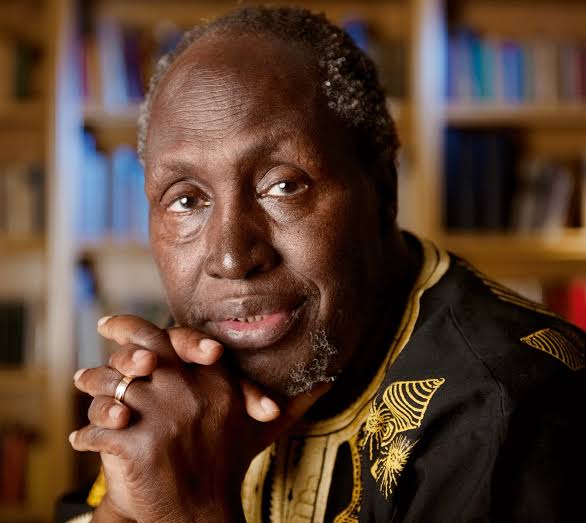
In 1977, Ngũgĩ co-wrote the play Ngaahika Ndeenda (I Will Marry When I Want), performed in the Gikuyu language with local villagers. Its revolutionary message led to his arrest and imprisonment without trial.
During his time in Kamiti Maximum Prison, Ngũgĩ wrote Devil on the Cross on prison-issued toilet paper, making literary history as the first modern Gikuyu-language novel.
After prison, Ngũgĩ fully rejected English as a creative medium and began advocating for African writers to write in their indigenous languages.
His critical essay collection, Decolonising the Mind (1986), became one of the most referenced texts on language, power, and identity in postcolonial African literature.
Exile and International Career
After being released from prison, Ngũgĩ faced threats in Kenya and eventually went into exile in the UK and later the United States.
He taught at top universities like Yale, NYU, and the University of California, Irvine, where he became Distinguished Professor of English and Comparative Literature.
Later Works and Recognition
Ngũgĩ’s later works continued to blend African oral tradition, satire, myth, and radical political thought.
The Perfect Nine (2020), written and translated by Ngũgĩ himself, reimagined the Gikuyu origin myth with a feminist touch and was longlisted for the 2021 International Booker Prize.
His short story, The Upright Revolution: Or Why Humans Walk Upright, has been translated into over 100 languages, making it the most translated short story in African literary history.
Ngũgĩ was honoured with dozens of awards and honorary degrees, some of which are the Nonino International Prize, the Park Kyong-ni Prize, and the PEN/Nabokov Award for International Literature.
Death and Legacy
Ngũgĩ wa Thiong’o died on May 28, 2025, in Buford, Georgia, USA, at the age of 87, following complications related to kidney failure. He left behind a legacy that spanned over six decades and influenced generations of writers, scholars, and cultural critics.
His insistence on writing in African languages, his fearless critique of neo-colonial regimes, and his literary brilliance have cemented his place as one of the greatest African writers of all time.
Why Ngũgĩ wa Thiong’o Still Matters
Ngũgĩ taught us that language is not neutral. To write in one’s own language is to reclaim memory, culture, and identity. In a world still shaped by colonial structures, his voice remains as urgent and relevant as ever.
“If you know all the languages of the world and you don’t know your mother tongue, that is enslavement… but if you know your mother tongue and add other languages, that is empowerment.”
Ngũgĩ wa Thiong’o
Further Reading on Literature PADI
Receive Literary Updates through our Social Media Channels:
- WhatsApp: Literature PADI
- Telegram: Literature PADI
- YouTube: @literaturepadi
- Facebook: Literature PADI


